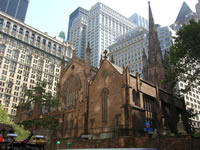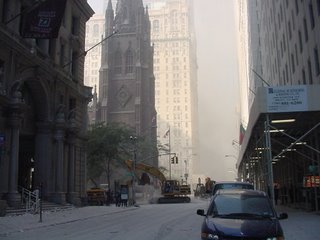Trinity's Lessons & Carols

They dubbed it "Lessons & Carols, American-Style." What a humble name for a most powerful liturgy!
Last night, while at home between our 5:00 "family service" and the 11:00 festival Eucharist, I had my stereo on the local public radio station. And I had the serendipitous delight of catching a broadcast from Trinity Wall Street, thanks to Public Radio International. Trinity dubbed it "Lessons & Carols, American-Style."
Trinity, that venerable old institution in the Episcopal Church. Trinity, that parish that does so much to support the poor in this nation and throughout the world. Trinity, where George Washington stopped to pray after his inauguration, and where so many of the rich and powerful have gone to worship ever since.
 When the program began, I was only half-listening. But I gather that this version of the festival of lessons and carols was most profoundly shaped by the experience that Trinity endured in the September 2001 attacks on the World Trade Center and by the parish's work to minister in the aftermath of that horrible event. That would be most appropriate, since the service most of us now know from England was shaped by the horrific events of World War I. Trinity's program is a powerful new rendering on an old theme.
When the program began, I was only half-listening. But I gather that this version of the festival of lessons and carols was most profoundly shaped by the experience that Trinity endured in the September 2001 attacks on the World Trade Center and by the parish's work to minister in the aftermath of that horrible event. That would be most appropriate, since the service most of us now know from England was shaped by the horrific events of World War I. Trinity's program is a powerful new rendering on an old theme.
Here is the explanation from their website:
For its fans, the King’s College Cambridge Lessons and Carols radio program is synonymous with Christmas. It’s about time that there was an American answer to this famous and beautifully done program – at least that’s what Public Radio International (PRI) and producer Malcolm Bruno thought.
Bruno teamed up with Trinity Church's Music Director, Owen Burdick, to create A Vigil for Christmas, a program that featured the Trinity Choir and selected readings performed by actor Sam Waterston.
Departing from the strict “lessons and carols” format, the program’s readings included psalms, Matthew Arnold’s Dover Beach, and a selection from Shakespeare. Musical offerings included works by Handel, Haydn, Pärt, and Howells. PRI made the program available to their syndicate and satellite stations, to be broadcast at their discrimination.
You can hear the broadcast in high or low bandwidth. And the readings are available here. Prepare to have your socks knocked off! Especially in the final reading, from a 1925 address, including these words:
Violence defeats itself. It is no way to achieve family life or education or religion or stable government. Those who rely on it as their mainstay and effective instrument are sure to miss what they are seeking to achieve. Always progress has consisted in carrying over human life from violence to co-operation.And now we face the next great step, the most momentous step in human history. Can we achieve a like result with our international relationships? Can we carry them over from brutality and organised slaughter to reasonableness and co-operation?What parish in America has more right to speak and sing and shout out against the excesses of "religion" in all its hateful manifestations?
Here, then, we face one of the most crucial and dramatic conflicts of loyalty that men ever dealt with. On the one side is a narrow patriotism saying “My country against yours,” on the other a wider patriotism saying, “My country with yours for the peace of mankind.” Is there any question where real Christianity must stand in that conflict?
. . . [T]he Church has come down through history too often trying to carry the cross of Jesus in one hand and a dripping sword in the other, until now when Christians look out upon the consequence of it all, this abysmal disgrace of Christendom making mockery of the Gospel, the conviction rises that we would better go back to our first traditions, our early purity, and see whether those first disciples of the Lord were not nearer right than we have been.
We cannot reconcile Jesus Christ and war – that is the essence of the matter. That is the challenge which today should stir the conscience of Christendom. War is the most colossal and ruinous social sin that afflicts mankind; it is utterly and irremediably unchristian; in its total method and effect it means everything that Jesus did not mean and it means nothing that he did mean.
It would be worth while, would it not, to see the Christian Church claim as her own this greatest moral issue of our time, to see her lift once more a clear standard against the paganism of this present world and, refusing to hold her conscience at the beck and call of belligerent states, put the kingdom of God above nationalism and call the world to peace? That would not be the denial of patriotism but its apotheosis.
Powerful, powerful stuff – in this season when we supposedly celebrate the birth of the Prince of Peace.
Go. Listen. Read, mark, and inwardly digest. I most heartily commend this resource to you.


0 Comments:
Post a Comment
<< Home